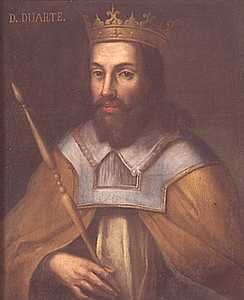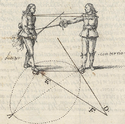|
|
You are not currently logged in. Are you accessing the unsecure (http) portal? Click here to switch to the secure portal. |
Duarte I de Portugal
| Duarte Ⅰ de Portugal | |
|---|---|
 | |
| Born | 31 October 1391 Viseu, Portugal |
| Died | 9 September 1438 Tomar, Portugal |
| Resting place | Monastery of Batalha |
| Spouse(s) | Eleonora d'Aragona |
| Children |
Infante Afonso
|
| Relative(s) |
|
| Occupation | King of Portugal (1433-38) |
| Genres | Fencing manual |
| Language | Old Portuguese |
| Manuscript(s) | MS Portugais 5 (1438) |
| First printed english edition |
Preto, 2005 |
Duarte, KG, (1391 – 1438), called the Philosopher or the Eloquent, was King of Portugal and the Algarve and second Lord of Ceuta from 1433 until his death. He was born in Viseu, the son of João Ⅰ de Portugal and Philippa of Lancaster. Duarte was the oldest member of the Ínclita Geração ("Illustrious Generation").
As an infante (prince), Duarte always followed his father in the affairs of the kingdom. He was knighted in 1415, after the Portuguese capture of the city of Ceuta in North Africa, across from Gibraltar. On 22 September 1428, he married Eleonora d'Aragona, who would ultimately bear him nine children (of whom five survived to adulthood). Duarte became king in 1433 when his father died of the Black Death.[1] He soon showed interest in building internal political consensus. During his short reign of five years, Duarte called the Cortes (the Portuguese national assembly) no less than five times to discuss the political affairs of his kingdom. He also followed the politics of his father concerning the maritime exploration of Africa. He encouraged and financed his famous brother, Henrique "the Navigator", who initiated many expeditions on the west coast of Africa. That of Gil Eanes in 1434 first rounded Cape Bojador on the northwestern coast of Africa, leading the way for further exploration southward along the African coast.
In 1437, Duarte's brothers Henrique and Fernando persuaded him to launch an attack on the Marinid sultanate of Morocco. The expedition was not unanimously supported, and was undertaken against the advice of the Pope.[1] His brothers Pedro and João were both against the initiative; they preferred to avoid conflict with the king of Morocco. Their instincts proved to be justified. The resulting attack on Tangier, led by Henrique, was a debacle. Failing to take the city in a series of assaults, the Portuguese siege camp was soon itself surrounded and starved into submission by a Moroccan relief army. In the resulting treaty, Henrique promised to deliver Ceuta back to the Marinids in return for allowing the Portuguese army to depart unmolested. Duarte's youngest brother, Fernando, was handed over to the Marinids as a hostage for the final handover of the city.
The debacle at Tangier dominated Duarte's final year. Pedro and João urged him to fulfill the treaty, yield Ceuta and secure Fernando's release, while Henrique (who had signed the treaty) urged him to renege on it. Caught in indecision, Duarte assembled the Cortes at Leiria in early 1438 for consultation. The Cortes refused to ratify the treaty, preferring to hang on to Ceuta and requesting that Duarte find some other way of obtaining Fernando's release.
Duarte died late that summer, in Tomar, of the plague, like his father and mother (and her mother) before him. Popular lore suggested he died of heartbreak over the fate of his hapless brother; Fernando would remain in captivity in Fez until his own death in 1443.[1]
Duarte's premature death provoked a political crisis in Portugal. Leaving only a young son, Afonso, to inherit the throne, it was generally assumed that Duarte's brothers would take over the regency of the realm. But Duarte's will appointed his unpopular foreign wife, Eleonora d'Aragona, as regent. A popular uprising followed, in which the burghers of the realm, assembled by João de Reguengos, acclaimed Pedro as regent. But the nobles backed Eleanora's claim, and threatened civil war. The regency crisis was defused by a complicated and tense power-sharing arrangement between Eleanora and Pedro.
Another less political side of Duarte's personality is related to culture. A reflective and scholarly infante, he wrote the treatises O leal conselheiro ("The Loyal Counselor") and Livro da ensinança de bem cavalgar toda sela ("Book of Teachings on Riding Well in Every Saddle"), both of which now comprise the MS Portugais 5, as well as several poems and a series of miscellaneous advice that was ultimately collected in Livro dos conselhos ("Book of Counsel"). He was in the process of revising the Portuguese law code when he died.
Contents
Treatises
In addition to his treatise on mounted combat, he also wrote a brief passage in his Livro dos conselhos called Regimento para aprender alguas cousas armas ("Regimen to Learn Certain Matters of Arms") which offers a few interesting points of guidance on training.
Transcription | |
|---|---|
Regimen to Learn Some Things of Arms: On the third hour on some days he goes to practice. And to practice he should arm himself with all weapons and goes on foot a great distance up a [hill] for a long length[2] to strengthen himself. Later he returns to his house, and there he has arms of fine steel but for other men, he has there lances and axes and wooden swords. And when wishing to test [himself] with a particular weapon[3] he does so with a heavier weapon which is something more than of those seeking to carry on the day of combat. And in proving [himself] in using these, he ends in learning various ways and guards and offences[4] that others know how to do. And if in eight to ten days there is no one with whom to practice, he may rehearse[5] with anyone with whom he wants. And in this manner one will have good courage, and learn of the uses of others in feats of arms. |
Regimento pera aprender alguas cousas d armas a ora de Terça se va algus dias ansayer/ e o ensayer seJa este, ele se ha d armar de todas armas e hir a pe por hua costa açima hu grande pedaço e mais riJo que poder, e depois se torne pera casa, e aly tenha armas de fynos ferros pera outros homens, e tenha lanças e fachas e espadas de pao/ e quando se quiser prouar com alguem arme se com armas mais pesadas hua vez e mea mais que aquelas que ouuer de trazer no dia da peleJa e este prouar que fizer com estes, faça por aprender alguas maneyras e gardas e offensas que outros sabem fazer, e se em oito ou dez dias non viernynguem a se ensayer. // Pode se emsayer con quem quyser, e esta maneira faz ter bom foleguo, e aprender de hus e dos outros em feito d armas |
For further information, including transcription and translation notes, see the discussion page.
| Work | Author(s) | Source | License |
|---|---|---|---|
| Translation | Steve Hick | ||
| Transcription | João José Alves Dias |
Additional Resources
The following is a list of publications containing scans, transcriptions, and translations relevant to this article, as well as published peer-reviewed research.
- Dom Duarte, King of Portugal (1944). Livro da ensinança de bem cavalgar toda sela que fez elrey dom Eduarte de Portugal e do Algarve e senhor de Ceuta. Ed. by Joseph M. Piel. Lisboa: Livraria Bertrand.
- Duarte (2005). The Royal Book of Jousting, Horsemanship and Knightly Combat. Trans. by Antonio Franco Preto. Ed. by Steven Muhlberger. Highland Village: Chivalry Bookshelf. ISBN 978-1-891448-11-9.
- Duarte I of Portugal (2016). The Book of Horsemanship by Duarte I of Portugal. Trans. by Jeffrey L. Forgeng. Woodbridge: Boydell Press. ISBN 978-1783271030.
- Hick, Steve (2002). "Dom Duarte and his advice on swordsmanship." Spada: Anthology of Swordsmanship 2: 65-71. Union City: Chivalry Bookshelf. ISBN 1-891448-37-4.
- Preto, António Franco; Luis Preto (2011). The Art of Riding on Every Saddle: Livro da Ensinança de Bem Cavalgar Toda Sela. Self-published. ISBN 978-1461106616.
References
|
|||||||||||||||||||||||||||

